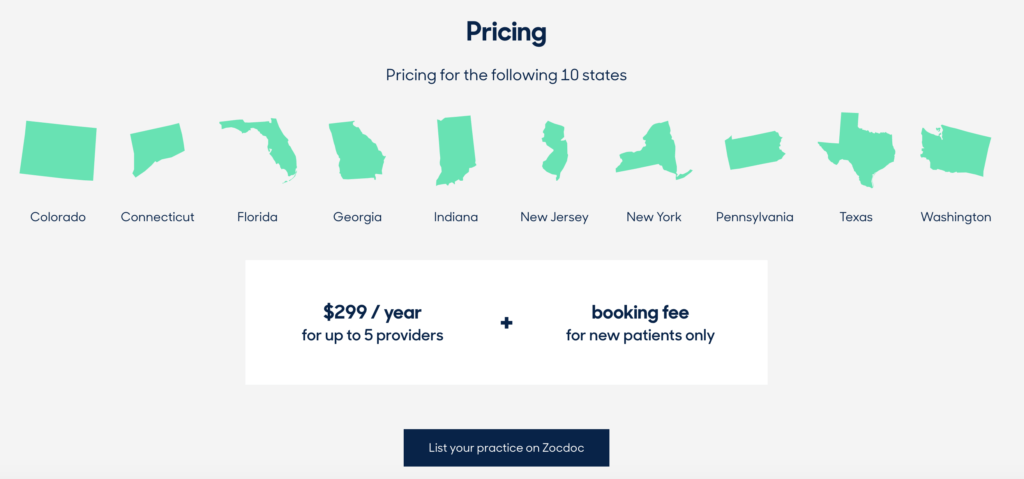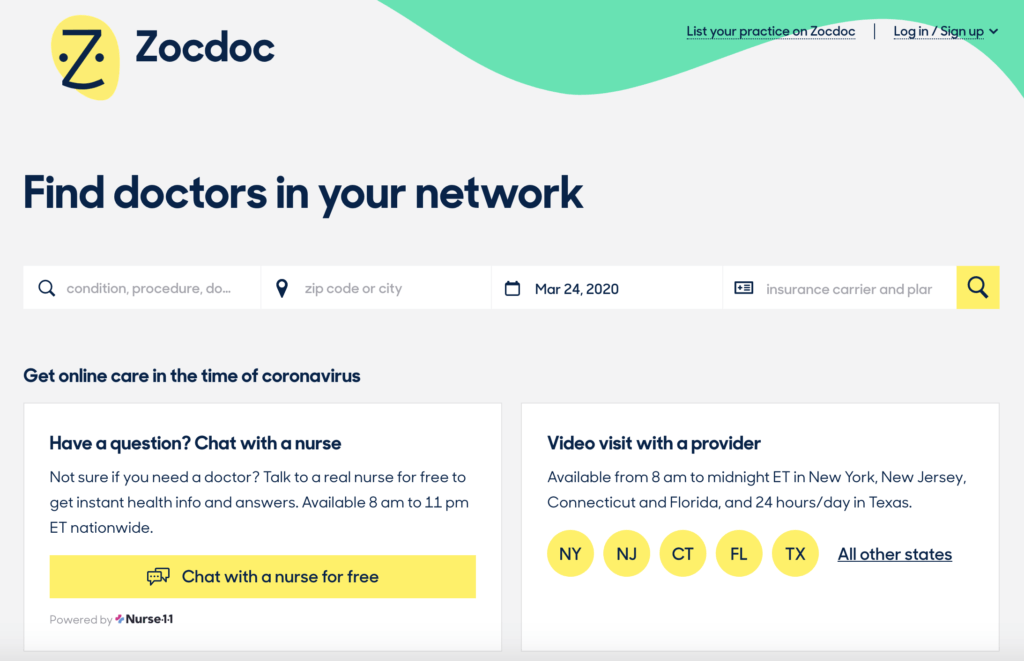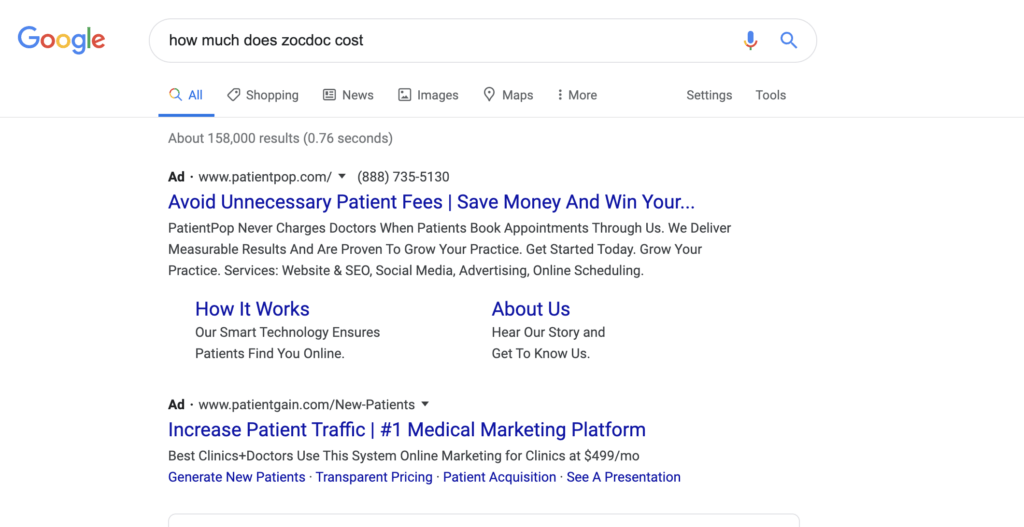Zocdoc: A two-sided platform charging one side

Zocdoc connects patients with healthcare providers. It recently adjusted its pricing structure for several markets to attract new physicians to the site. However, Zocdoc must balance the fee structure of its existing physician base with new account acquisition.
Zocdoc is a two-sided platform that connects patients with physicians. It makes money by charging physicians, who chalk it up to marketing and scheduling costs.
VALUE CREATION
Zocdoc creates value for customers, healthcare professionals, and other stakeholders in the healthcare industry.
For consumers, Zocdoc provides value in the form of (1) search, (2) information, and (3) convenience. Zocdoc solves the (1) search problem, enabling consumers to browse troves of local medical professionals and filter based on type of medicine (i.e., generalist, vision, ENT, etc.) insurance acceptance, location, availability, gender, ratings, etc. Furthermore, it solves for a dearth of (2) information on the consumer side. Healthcare is one industry where quality of service largely goes unmonitored (with the exception of malpractice) – consumer input ratings shed light within this black box, providing information on promptness of service, bedside manner, etc. Finally, Zocdoc facilitates (3) ease of booking. Instead of calling a doctor’s office and waiting on hold to schedule an appointment, one can simply book online – streamlining an otherwise cumbersome process compared to other industries in the digital age. The platform then sends email confirmations and reminders for upcoming appointments.
For doctors and healthcare professionals, Zocdoc alleviates (1) scheduling and check-in, and serves as a tool for (2) customer acquisition. Migrating scheduling from phone to online on the Zocdoc platform frees up administrative staff at physician offices to perform other more urgent or higher-level tasks. Similarly, online check-in (i.e., inputting medical history, insurance info) reduces the check-in process in-person and again frees up administrative staff to even out their workload and perform non-urgent tasks in off-peak hours. Furthermore, a paramount value that Zocdoc provides is (2) marketing for physicians. It provides greater exposure and awareness, acting as a customer acquisition tool and filling excess capacity. High performing physicians can also reap the benefits of positive user reviews and be rewarded for their level of service.
Zocdoc arguably provides value to other stakeholders like insurance providers and large hospitals by focusing on preventative medicine (less costly) through annual checkup reminders. One might also argue that Zocdoc provides value to health insurance providers by offering filtered search for physicians by insurance plan, alleviating traffic to and the need for insurance companies to improve their lackluster provider search portals.
VALUE CAPTURE
Zocdoc captures value by charging the side of the platform that most benefits from its service – physicians. The service historically and still largely achieves this by charging a subscription fee: “The healthcare providers who partner with Zocdoc pay a subscription fee for Zocdoc’s service. We help providers increase the efficiency of their practices, fill their last-minute cancellations, and provide prompt medical care to patients like you!” (https://www.zocdoc.com/about/question/how-does-zocdoc-make-money/).
However, the company recently reduced the annual fee and added a fee per new patient in ten markets:
(https://www.zocdoc.com/about/join-pricing/#join-form)
Zocdoc had experimented with this customer acquisition fee in 2018, and due to provider backlash, put the plan on hold (https://www.cnbc.com/2018/08/07/zocdocs-price-surge-has-doctors-fretting-over-excessive-costs-and-an.html). Yet, one year later, Zocdoc again turned to this plan and implemented the new fee structure in several markets despite pushback by physicians. “Zocdoc had pitched the change as a way to attract suburban, rural and other practices that don’t have enough patients to justify paying Zocdoc a flat monthly fee…. Physicians now pay an annual $299 licensing fee, rather than the previous price of $3,000 a year, and pay a charge for new patients booking through Zocdoc that ranges from $35 to $110 based on their specialty” (https://www.modernhealthcare.com/physicians/zocdocs-new-pricing-rankles-new-york-doctors).
This pricing alleviates the financial burden on newer, smaller practices who sign up fewer new patients through the platform. At the same time, Zocdoc increases the customer acquisition cost for large and well-established practices who attract many new patients through the portal. It seems as though Zocdoc is phasing in this new fee structure to attract new physician accounts by subsidizing them with growing revenues from existing, large accounts.
SCALABILITY
Zocdoc is already in all states across the nation. It has yet to saturate many of these markets, however, with some states only listing a handful of doctors. It has employed a clustered approach, growing tremendously in certain markets. In order to scale across the nation, it must invest in local communities (since medical care is a local product, consumers and providers in the same region must grow together). The new pricing model, should it be rolled out across the nation, is well positioned to sign new, perhaps smaller accounts in smaller communities. Zocdoc should work to saturate the US market before entering others and should employ a similar cluster approach market by market, as there are community network effects as well as local intricacies that must be accounted for (e.g., regulation, insurance policies).
The platform has a leg up on competition since it was a first mover in this space. As it grows, however, it may bring the attention of larger players in adjacent industries who could encroach upon their market. For example, a company like Yelp, who specializes in consumer feedback and ratings, could enter the healthcare rating and scheduling market (much like they’ve entered the food delivery rating and service market). Or, perhaps less of a threat, a company like Opentable who specializes in booking and ratings could port their technology over to the healthcare industry. Zocdoc must continue to scale quickly to defend their niche against larger adjacencies.
Zocdoc can also scale laterally. Namely, telemedicine is extremely well suited to Zocdoc’s existing infrastructure and brand. Due to COVID-19, the Zocdoc site actually prioritizes telemedicine solutions to the top of the home page (through a third party):
The company could look into building out its proprietary telemedicine capabilities for the sustained future as another source of growth.
SUSTAINABILITY
The platform relies on several contingencies to sustain itself. Physicians on the platform must continue to update the site with their availability and honor reservations made on the site (speaking from experience as I have been told by a Dr.’s office that they do not honor Zocdoc bookings). One way to ensure sustainability in this regard is for Zocdoc to provide offerings for physician offices to integrate systems, including both scheduling and patient medical information. This can alleviate the burden on accounts and minimize cost of adoption and maintenance.
Likewise, patients must honor their bookings. Medical offices may drop Zocdoc if they feel their patients booking on the portal are unreliable. Zocdoc already creates accountability in this regard with their frequent appointment reminders and services to patients (e.g., address/directions, phone number, ability to cancel giving advance notice, etc.). Post-appointment reminders to rate physicians also creates a sustainable and growing library of user ratings.
One strategy that Zocdoc must monitor is the new fee structure, charging for new customer conversion. As bigger firms see this cost rise, perhaps they might now view other customer acquisition tools as more economical than their Zocdoc account. For example, when one types “How much does Zocdoc cost?” in Google Search, smaller competitors touting lower rates have paid to be a top search result:
Lastly, there are some exogenous factors that might threaten Zocdoc’s sustainability, namely, changing government regulation and insurance company policy. Zocdoc must insert itself within the conversations among these external forces, i.e., through lobbying or insurance company account managers.





